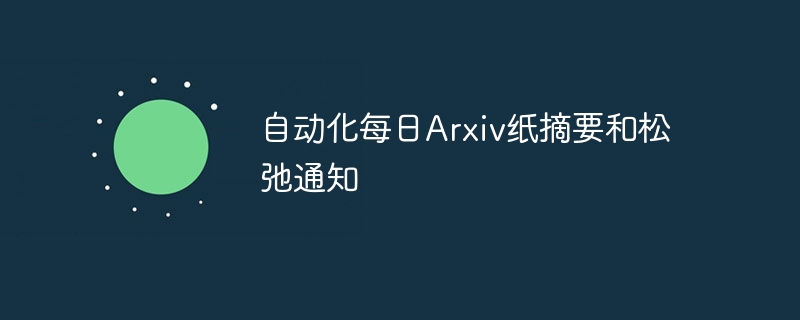this script automates the process of fetching dly arxiv papers, generating summaries using , and posting them to a slack channel. let’s improve the clarity and organization for better understanding.

This script retrieves papers from arXiv, summarizes them using generative AI (specifically, Google Gemini), and posts the summaries to a Slack channel.
I. Python Code:
import datetime import logging import os import time import arxiv import google.generativeai as genai from slack_sdk import WebClient from slack_sdk.errors import SlackApiError # Configuration (best practice to use environment variables for sensitive data) PAPER_TYPES = ["cs.ai", "cs.cy", "cs.ma"] GEMINI_API_KEY = os.environ.get("GEMINI_API_KEY") GEMINI_MODEL = "gemini-2.0-flash" SLACK_BOT_TOKEN = os.environ.get("SLACK_BOT_TOKEN") SLACK_CHANNEL = os.environ.get("SLACK_CHANNEL") MAX_RESULTS = 30 # Logging setup (highly recommended for debugging and monitoring) logging.basicConfig(level=logging.INFO, format='%(asctime)s - %(levelname)s - %(message)s') logger = logging.getLogger(__name__) def fetch_arxiv_papers(max_results: int = MAX_RESULTS) -> list: """Fetches relevant arXiv papers published within the last 24 hours.""" query = " OR ".join([f"cat:{paper_type}" for paper_type in PAPER_TYPES]) client = arxiv.Client() search = client.search(query=query, max_results=max_results, sort_by=arxiv.SortCriterion.SubmittedDate, sort_order=arxiv.SortOrder.Descending) papers = list(client.results(search)) if not papers: logger.warning("No papers found.") return [] latest_published = papers[0].published threshold = latest_published - datetime.timedelta(hours=24) filtered_papers = [paper for paper in papers if paper.published >= threshold] return [ { "title": paper.title, "summary": paper.summary, "pdf_url": paper.pdf_url, "published": paper.published, } for paper in filtered_papers ] def summarize_paper(abstract_text: str) -> str: """Generates a summary of the paper abstract using Google Gemini.""" try: genai.configure(api_key=GEMINI_API_KEY) model = genai.GenerativeModel(GEMINI_MODEL) prompt = ( "Summarize the following paper abstract concisely (under 300 characters) for beginners, " "including significance and results. Output only the summary. --- " f"{abstract_text}" ) response = model.generate_content(prompt) return response.text.strip() except Exception as e: logger.error(f"Error summarizing paper: {e}") return "Error generating summary." def post_to_slack(papers: list) -> None: """Posts the paper summaries to the specified Slack channel.""" if not papers: return client = WebClient(token=SLACK_BOT_TOKEN) messages = [] for i, paper in enumerate(papers, 1): summary = summarize_paper(paper["summary"]) # Summarize here, not in main loop message = ( f"{i}. *{paper['title']}* " f"{summary} " f"PDF: {paper['pdf_url']} " f"Published: {paper['published']} " f"────────────────────────" ) messages.append(message) all_messages = " ".join(messages) try: result = client.chat_postMessage(channel=SLACK_CHANNEL, text=all_messages) logger.info(f"Slack message sent successfully: {result}") except SlackApiError as e: logger.error(f"Error posting to Slack: {e}") def lambda_handler(event, context): """AWS Lambda handler function.""" papers = fetch_arxiv_papers() post_to_slack(papers) return { 'statusCode': 200, 'body': "Successfully processed arXiv papers and posted to Slack." }
II. Local Setup and Deployment to AWS Lambda:
- Environment Setup: Use pyenv to manage Python versions. Install Python 3.12.
- Install Libraries: Create a folder (e.g., lambda_dependencies), then install requi libraries:
pip install arxiv google-generativeai slack_sdk -t lambda_dependencies
登录后复制 - Create Zip File: Zip the lambda_dependencies folder:
zip -r lambda_layer.zip lambda_dependencies/*
登录后复制 - Create AWS Lambda Layer: Upload lambda_layer.zip as a new layer in AWS Lambda. Set architecture to x86_64 and runtime to Python 3.12.
- Create AWS Lambda Function: Upload the modified Python code (above) to a new Lambda function. Configure the function to use the created layer. Set environment variables (GEMINI_API_KEY, SLACK_BOT_TOKEN, SLACK_CHANNEL).
- Schedule with AWS EventBridge: Create an EventBridge rule with a cron expression (e.g., cron(30 6 * * ? *) for 6:30 AM UTC daily) and set the Lambda function as the target.
III. Important Considerations:
- Error Handling: The improved code includes more robust error handling using try…except blocks and logging. This is crucial for reliable operation.
- Rate Limiting: Be mindful of API rate limits for both arXiv and Gemini. The code includes a small delay (time.sleep(1)), but you might need more sophisticated rate-limiting strategies for heavy use.
- Security: Never hardcode API keys directly in your code. Always use environment variables.
- Logging: Comprehensive logging is essential for debugging and monitoring the function’s execution.
- Testing: Thoroughly test your code locally before deploying it to AWS Lambda.
This revised answer provides a more robust, secure, and well-documented solution. Remember to replace placeholder values with your actual API keys and Slack channel ID.
以上就是自动化每日Arxiv纸摘要和松弛通知的详细内容,更多请关注php中文网其它相关文章!
 微信扫一扫打赏
微信扫一扫打赏
 支付宝扫一扫打赏
支付宝扫一扫打赏

